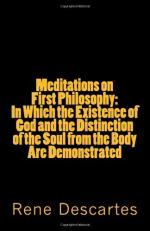and certain of; and, in short, be reduced to believe
that we have no eligibility or choice of two courses,
or things proposed, about which we fairly deliberate
upon any occasion. Nothing does religion more
honour than to see men necessitated to fall into such
gross and monstrous extravagance as soon as they call
in question the truths she teaches. On the other
hand, if we own that man is truly free, we acknowledge
in him a principle that never can be seriously accounted
for, either by the combinations of atoms or the laws
of local motion, which must be supposed to be all
equally necessary and essential to matter, if one
denies a first mover. We must therefore go out
of the whole compass of matter, and search far from
combined atoms some incorporeal principle to account
for free-will, if we admit it fairly. Whatever
is matter and an atom, moves only by necessary, immutable,
and invincible laws: wherefore liberty cannot
be found either in bodies, or in any local motion;
and so we must look for it in some incorporeal being.
Now whose hand tied and subjected to the organs of
this corporeal machine that incorporeal being which
must necessarily be in me united to my body?
Where is the artificer that ties and unites natures
so vastly different? Can any but a power superior
both to bodies and spirits keep them together in this
union with so absolute a sway? Two crooked atoms,
says an Epicurean, hook one another. Now this
is false, according to his very system; for I have
demonstrated that those two crooked atoms never hook
one another, because they never meet. But, however,
after having supposed that two crooked atoms unite
by hooking one another, the Epicurean must be forced
to own that the thinking being, which is free in his
operations, and which consequently is not a collection
of atoms, ever moved by necessary laws, is incorporeal,
and could not by its figure be hooked with the body
it animates. Thus which way so ever the Epicurean
turns, he overthrows his system with his own hands.
But let us not, by any means, endeavour to confound
men that err and mistake, since we are men as well
as they, and no less subject to error. Let us
only pity them, study to light and inform them with
patience, edify them, pray for them, and conclude
with asserting an evident truth.
Sect. LXXXVIII. We must necessarily acknowledge the Hand of a First Cause in the Universe without inquiring why that first Cause has left Defects in it.
Thus everything in the universe—the heavens, the earth, plants, animals, and, above all, men—bears the stamp of a Deity. Everything shows and proclaims a set design, and a series and concatenation of subordinate causes, over-ruled and directed with order by a superior cause.




